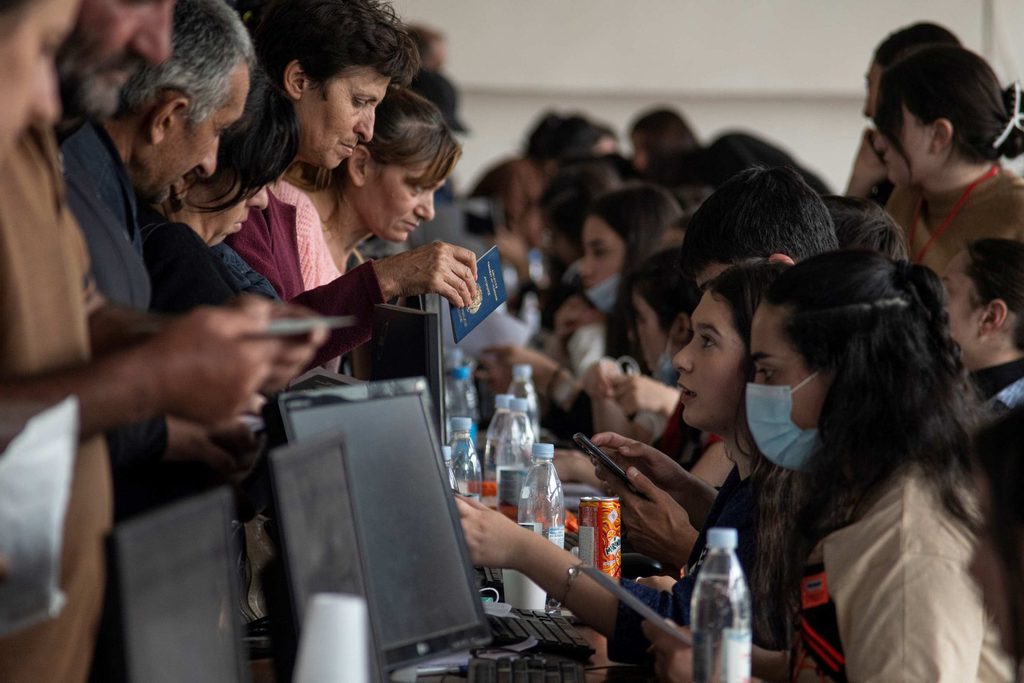In less than a week, over 100,000 ethnic Armenians from Nagorno-Karabakh – almost the entire estimated population of the territory - have poured into neighbouring Armenia, triggering a humanitarian crisis with acute health needs, WHO announced on Sunday.
WHO is working urgently to support the Ministry of Health of Armenia, under the wider government-led response, both now and in the months ahead.
Dr Hans Henri P Kluge, Regional Director of the WHO Regional Office for Europe, deployed an envoy to help assess the situation and strategize with the Armenian Ministry of Health on a comprehensive health emergency plan as soon as the exodus began.
“We have already mobilized health supplies and international expertise to assist a health system dealing with a sudden, massive influx of refugees, many of whom have specific medical needs," he said.
Referring to the dramatic explosion on Wednesday of a fuel depot along the route taken by those entering Armenia, WHO is dispatching burns kits to support the advanced care need for severe burns patients. The blast killed at least 170 people and injured 200 more, many with grievous burns.
WHO has agreed with the Armenian Ministry of Health on immediately mobilizing burns experts from Israel, Belgium and Lebanon, and supplies to treat the injured.
To support the general health needs of the displaced population, WHO is also sending medicines for non-communicable diseases, that will cover 3 months of treatments for up to 50,000 persons.
“My visit to Goris, near the border crossing-point, where I met with officials, local non-governmental organizations and humanitarian responders and beneficiaries of health and other essential services, filled me with sadness but also hope,” said Robb Butler, WHO’s Special Envoy.
“At the first major town the refugees are fleeing to, I saw an immense outpouring of solidarity from the local Armenian community and volunteers, who are doing all they can to provide food, water and shelter. But you see the despair on many of the faces of the displaced. They have left everything behind, their homes, their belongings, the graves of their loved ones.
Ethnic cleansing or displacement
Nagorno-Karabakh was an Armenian enclave inside Azerbaijan populated by about 120,000 ethnic Armenians before the latest Azerbaijani offensive.
Following the first Armeni-Azerbaijani war after the dissolvement of Soviet Union, Nagorno-Karabakh became a break-away republic. The first war claimed the lives of 30,000 people and led to the displacement of hundreds of thousands of Azerbaijanis from Karabakh and Armenia itself.
The latest offensive, described as a counter-terrorism operation by the Azerbaijani government, dealt the death blow to the break-away republic. Azerbaijan has offered the Armenians citizenship and equal rights but the majority of them did not believe the promises and have fled their ancient lands in fear of ethnic cleansing.
A statement on Friday by the spokesperson of the European External Action Service (EEAS) fell short of calling the escape of Armenian refugees “ethnic cleansing”.
“A mass exodus of Karabakh Armenians is currently taking place, as a result of Azerbaijan’s military operation of 19 and 20 September and of the previous months-long blockage of the Lachin corridor. People are fleeing their homes in Nagorno-Karabakh and are finding refuge in Armenia.”
“Azerbaijan bears the responsibility to ensure the rights and security of the Karabakh Armenians, including their right to live in their homes in dignity without intimidation and discrimination, as well as the right to return for those displaced. It is essential that a UN mission can access the territory within the next days.”
It is urgent to ensure continuous unimpeded humanitarian support to those who are still in need in Karabakh, as well as to those who have left, the statement said. The EU supports the work of the International Committee of the Red Cross (ICRC) and has announced an additional package of humanitarian aid of € 5 million to assist people displaced from and inside Nagorno-Karabakh.
M. Apelblat
The Brussels Times

